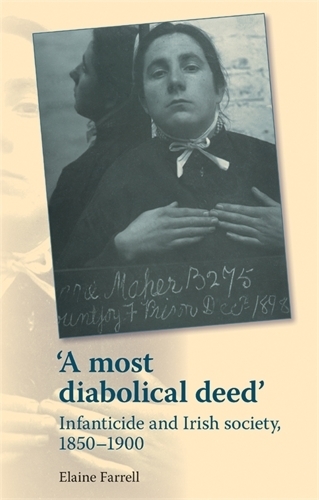
A Most Diabolical Deed': Infanticide and Irish Society, 18501900
(Paperback)
Available Formats
Publishing Details
A Most Diabolical Deed': Infanticide and Irish Society, 18501900
By (Author) Elaine Farrell
Manchester University Press
Manchester University Press
21st June 2016
United Kingdom
Classifications
Physical Properties
Paperback
288
Width 138mm, Height 216mm
Description
Winner of the NUI Publication Prize in Irish History 2015. This book examines the phenomenon of infanticide in Ireland from 1850 to 1900, examining a sample of 4,645 individual cases of infant murder, attempted infanticide and concealment of birth. Evidence for this study has been gleaned from a variety of sources, including court documents, coroners' records, prison files, parliamentary papers, and newspapers. Through these sources, many of which are rarely used by scholars, attitudes towards the crime, the women accused of the offence, and the victim, are revealed. Although infant murder was a capital offence during this period, none of the women found guilty of the crime were executed, suggesting a degree of sympathy and understanding towards the accused. Infanticide cases also allude to complex dynamics and tensions between employers and servants, parents and pregnant daughters, judges and defendants, and prison authorities and inmates. This book highlights much about the lived realities of nineteenth-century Ireland. -- .
Reviews
Elaine Farrells richly detailed and compelling analysis of these cases provides readers with a vivid insight into Irish society and culture in this period, paying particular attention to the nuances of gender and class as factors in shaping individual lives.
Farrell has produced a meticulous and well-written study that deserves a wide audience, and will undoubtedly be of immense benefit to all those interested in the histories of gender, crime and childhood. Accessible, nuanced and engaging, A most diabolical deed will prove an essential addition to reading lists for both undergraduate and postgraduate modules dealing with gender and criminal justice, as well as to broader surveys of nineteenth century Britain and Ireland.
, Daniel J.R. Grey, Plymouth University, SOLON: 2013 (3), 2013|Elaine Farrells book is a very important addition to the growing literature on Irish womens history in the modern period., Brian Griffin, Bath Spa University, Irish Studies Review 22.4 November 2014, 1 November 2014
A meticulously researched and well written work on a grisly subject.
Oliver Rafferty, Boston College, Journal of Ecclesiastical History
Author Bio
Elaine Farrell is Lecturer in Modern Irish Economic and Social History at Queens University Belfast
